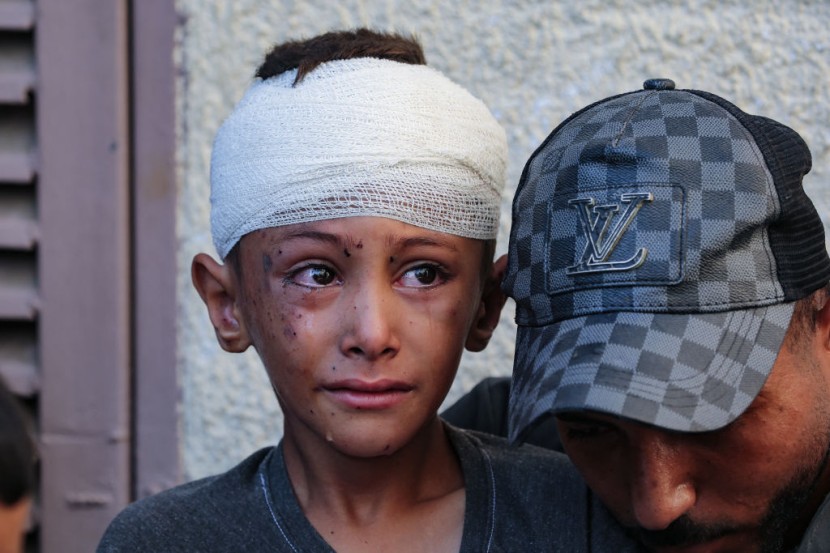
Deadly Israeli strikes hit Lebanon and Gaza on Saturday as the U.S. secretary of state headed back to Israel aiming to finalize a Gaza truce agreement, which diplomats say could help avert a wider regional conflagration.
Lebanon's health ministry said an Israeli air strike in southern Lebanon killed 10 people including a Syrian woman and her two children.
The strike was among the deadliest in southern Lebanon since the onset of near-daily exchanges of fire between Israel and Hezbollah following the start of the Gaza war in October.
Israel's military said it struck a Hezbollah weapons storage facility.
In Hamas-run Gaza, civil defense rescuers said an Israeli air strike killed 15 people from a single Palestinian family. The deaths in Al-Zawaida, central Gaza, added to a toll that the territory's health ministry says exceeds 40,000.
"We are in the morgue seeing indescribable scenes of limbs and severed heads and children who are dismembered," said relative Omar al-Dreemli.
The Gaza war between Israel and Hamas Palestinian militants has displaced most of the territory's population, destroyed much of the housing and other infrastructure, and triggered the spread of disease.
The United Nations on Friday appealed for seven-day pauses in the fighting so it could vaccinate children against polio after the Palestinian health ministry reported Gaza's first polio case in 25 years.
"We are closer than we have ever been" to a ceasefire in the Gaza war, President Joe Biden said on Friday, though previous optimism during months of on-off talks has so far proven futile.
On Saturday a senior Hamas official, Sami Abu Zuhri, said Biden's comment is an "illusion."
The stakes have significantly risen since the killings in quick succession in late July of Fuad Shukr, a top operations chief of Hezbollah in south Lebanon, and Hamas political chief Ismail Haniyeh.
Their deaths led to vows of vengeance from Hezbollah, Iran and other Tehran-backed groups in the region which blamed Israel.
On Friday Hezbollah released a polished video appearing to show its fighters trucking large missiles through tunnels at an underground facility.
Israel claimed the killing of Shukr, in a strike on south Beirut, but has not commented directly on the killing of Haniyeh while he visited Tehran.
Hamas's unprecedented October 7 attack on Israel that triggered the war resulted in the deaths of 1,198 people, mostly civilians, according to an AFP tally of Israeli official figures.
Militants also seized 251 hostages, 111 of whom are still held in Gaza, including 39 the military says are dead. More than 100 were freed during a one-week truce in November.
U.S. Secretary of State Antony Blinken is leaving Saturday for Israel and seek to "conclude the agreement for a ceasefire and release of hostages and detainees," the State Department said.
With a deal "now in sight, no one in the region should take actions to undermine this process," Biden said.
Egyptian, Qatari and American mediators are working to finalize details of a framework ceasefire and hostage-release deal initially outlined by Biden in May. He said Israel had proposed it.
In a joint statement after two days of talks in Qatar, the mediators said they presented both sides with a proposal that "bridges remaining gaps."
Talks aiming to secure a deal are to resume in Cairo "before the end of next week," they said.
Hamas did not attend the Doha talks. An official of the Islamist movement, Osama Hamdan, told AFP on Thursday the group would join if the meeting set a timetable for implementing what Hamas had already agreed to.
A prospective cessation of hostilities has centered around a phased deal beginning with an initial truce.
On Friday, officials told AFP that Hamas will not accept "new conditions" from Israel.
Israeli Prime Minister Benjamin Netanyahu's office on Tuesday had detailed its conditions for a truce, including a "veto on certain prisoners" being released from its jails.
Foreign Minister Ayman Safadi of Jordan, a Western ally, blamed Netanyahu for "impeding attempts to finalize" a deal and urged pressure on him.
Egyptian Foreign Minister Badr Abdelatty on Saturday met his French counterpart Stephane Sejourne in Cairo for talks on "containing the escalation and efforts to reach a ceasefire," Egypt's foreign ministry spokesman said.
Netanyahu has denied being the obstacle to a deal, blaming Hamas.
On Friday, the Palestinian health ministry reported an unvaccinated 10-month-old child in Gaza had been diagnosed with highly infectious polio.
The announcement came hours after UN Secretary-General Antonio Guterres called for two seven-day breaks in the Gaza war to vaccinate more than 640,000 children against type 2 poliovirus, which was first detected in the territory's wastewater in June.
As truce talks took place, thousands of civilians were on the move again after the Israeli military issued fresh evacuation orders ahead of imminent military action in central-southern Gaza.
"During each round of negotiations, they exert pressure by forcing evacuations and committing massacres," said Issa Murad, a Palestinian displaced to Deir el-Balah.
Over the past day troops expanded their operations in the Khan Yunis area of Gaza's south, including by "eliminating" militants who had fired munitions toward Nirim, just outside Gaza, Israel's military said on Saturday.








